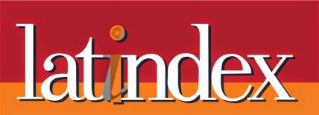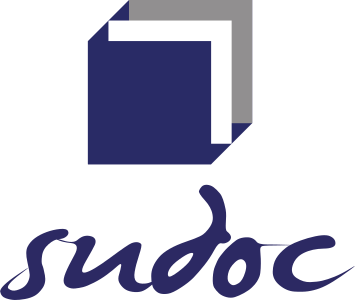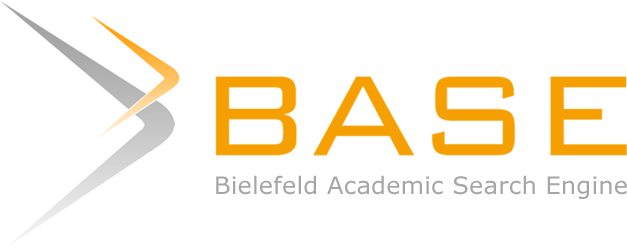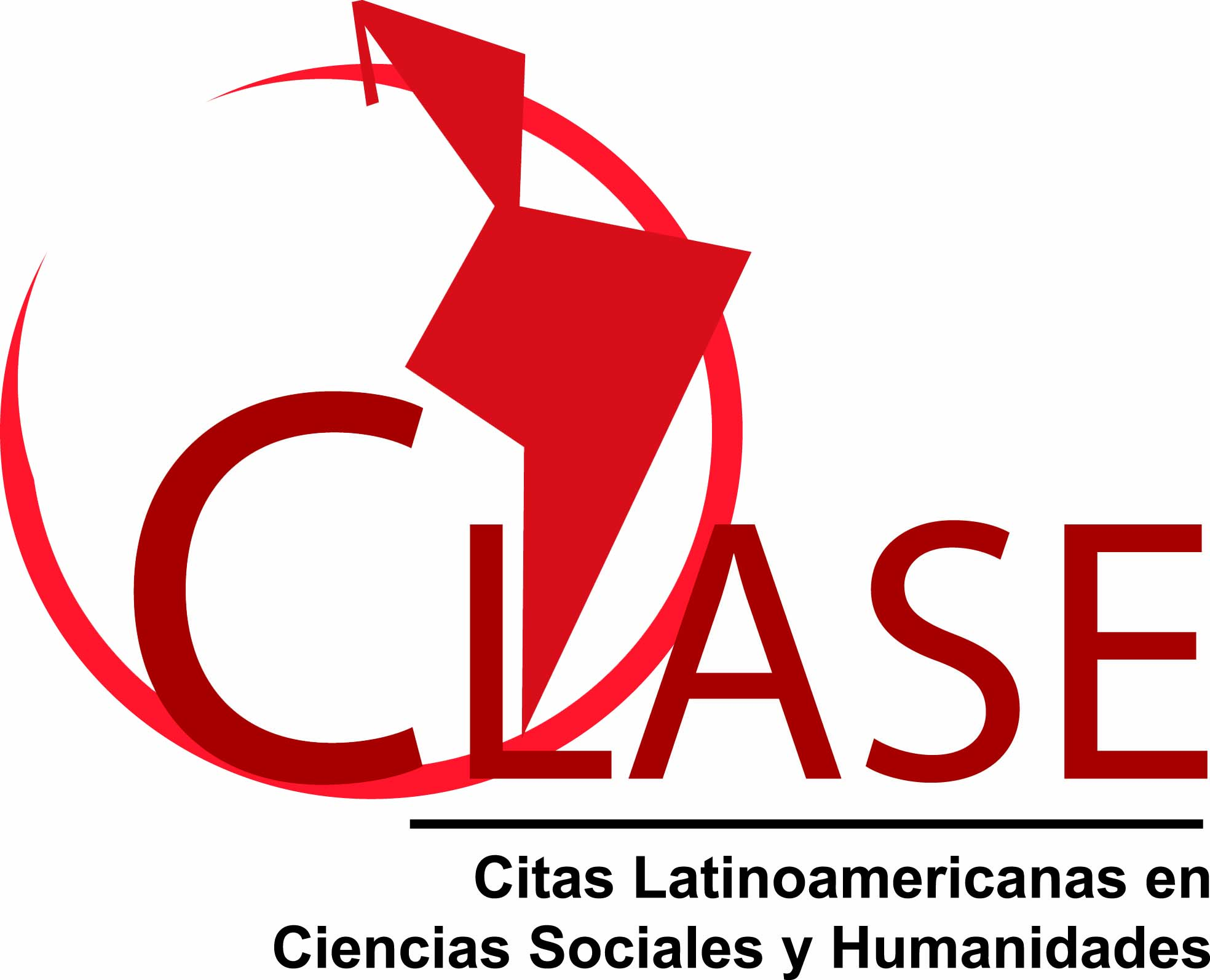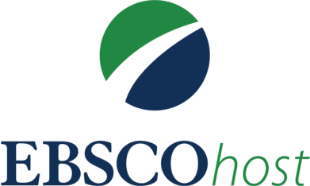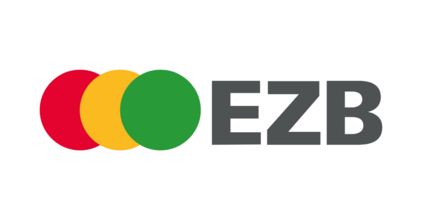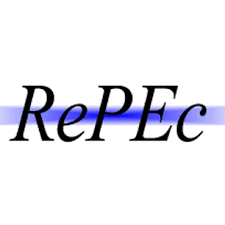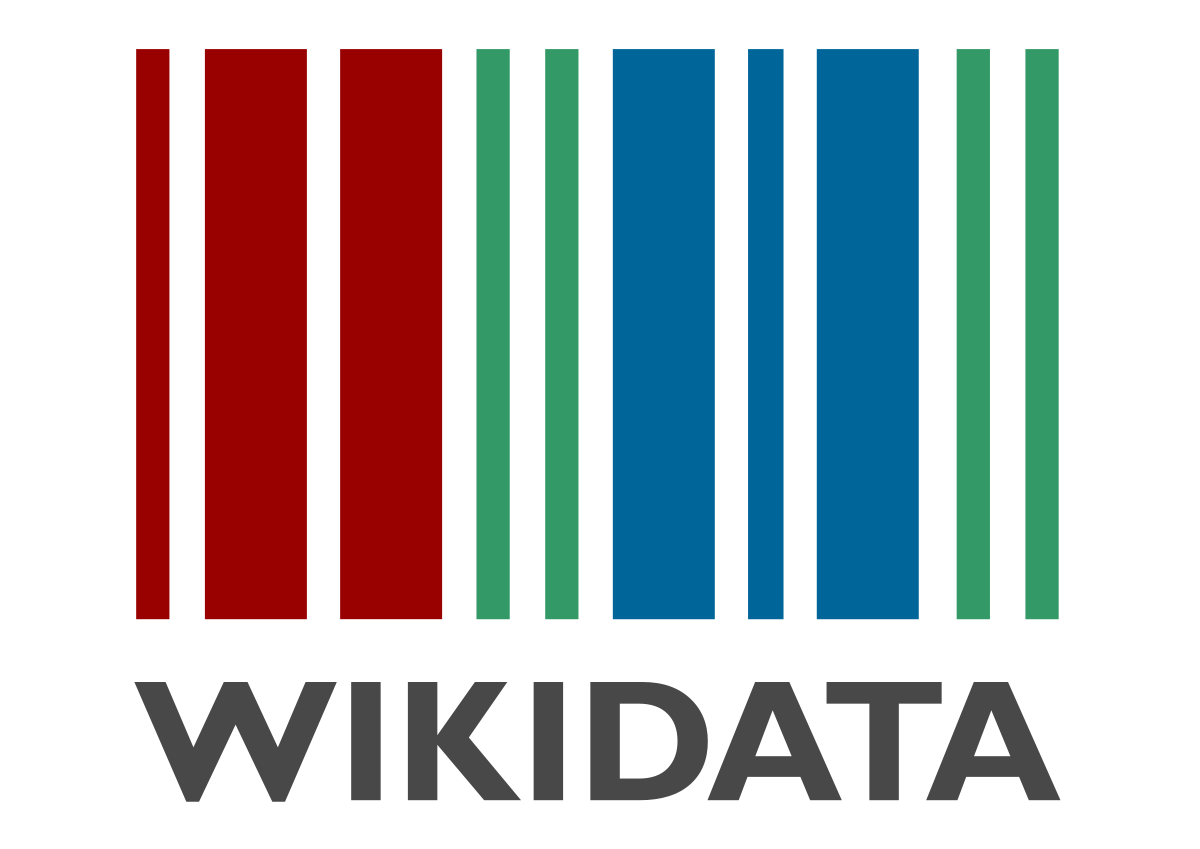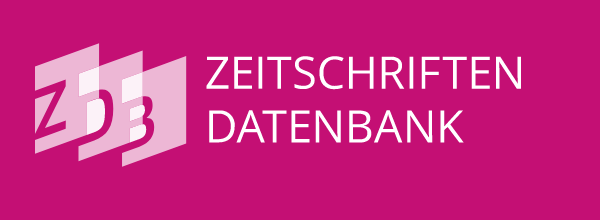El principio terapéutico frente al potenciamiento cognitivo mediante fármacos
DOI:
https://doi.org/10.36105/mye.2023v34n3.02Palabras clave:
potenciamiento, principio de totalidad, terapéutico, fármacos potenciadores, transhumanismoResumen
La presente es una investigación cualitativa que emplea una metodología de revisión de literatura, análisis y análisis fenomenológico. En la actualidad se ha reportado un uso no prescrito, por parte de personas sanas, de medicamentos destinados al tratamiento de padecimientos cognitivos. Dicha ingesta se ha llevado a cabo con fines potenciadores de capacidades cognitivas específicas tales como memoria, concentración y capacidad de reacción. Este empleo no recomendado de fármacos ha sido documentado mediante una serie de investigaciones y encuestas que encuentran una tendencia al alza en el consumo de estas drogas sobre todo en sectores específicos de la población como el universitario en países desarrollados. El carácter potenciador de estas drogas, cuando se consumen por personas sanas lleva a la necesidad de contrastar su uso con el principio bioético de totalidad o “terapéutico”. Por lo que el presente trabajo tiene como objetivo analizar si el uso de estas sustancias puede o no ser justificado desde una perspectiva bioética a la luz de la interpretación del principio de totalidad.
Se concluye que el empleo de potenciadores cognitivos puede ser permitido en personas sin patología específica pero que reporten un bajo rendimiento en determinadas áreas cognitivas o un detrimento en dichas capacidades derivado de la edad avanzada y no de una enfermedad diagnosticada. Lo anterior siempre que se cumplan criterios de seguridad y se lleven a cabo investigaciones serias y continuadas sobre sus beneficios en las poblaciones antes citadas.
Descargas
Referencias
Daubner J, Arshaad M, Henseler C, Hescheler J, Ehninger D, Broich K. Pharmacological Neuroenhancement: Current Aspects of Categorization, Epidemiology, Pharmacology, Drug Development, Ethics, and Future Perspectives. Neural Plasticity. 2021: 1-27. https://doi.org/10.1155/2021/8823383
Gracia D. Mejoramiento humano.¿ De qué estamos hablando? Perifèria Cristianisme, postmodernitat, globalització. 2017; 4(4). https://raco.cat/index.php/PeriferiaCPG/article/view/332501
Brühl A, d’Angelo C, Sahakian B. Neuroethical issues in cognitive enhancement: Modafinil as the example of a workplace drug? Brain and Neuroscience Advances. 2019; 3. https://doi.org/10.1177/2398212818816018
Kredlow M, Keshishian A, Oppenheimer S, Otto M. The efficacy of modafinil as a cognitive enhancer: a systematic review and meta-analysis. Journal of clinical psychopharmacology. 2019; 39(5):455-61.https://doi.org/10.1097/JCP.0000000000001085
Amadio J, Bi G, Boshears P, Carter A, Devor A, Doya K. Neuroethics questions to guide ethical research in the international brain initiatives. Neuron. 2018;100(1):19-36. https://doi.org/ 10.1080/21507740.2019.1632958
Racine E, Forlini C. Cognitive enhancement, lifestyle choice or misuse of prescription drugs? Neuroethics. 2010; 3(1):1-4. https://doi.org/10.1007/s12152-008-9023-7
d’Angelo L, Savulich G, Sahakian B. Lifestyle use of drugs by healthy people for enhancing cognition, creativity, motivation and pleasure. British Journal of Pharmacology. 2017; 174(19):3257-67. https://doi.org/10.1111/bph.13813
Greely H, Sahakian B, Harris J, Kessler RC, Gazzaniga M, Campbell P, et al. Towards responsible use of cognitive-enhancing drugs by the healthy. Nature. 2008; 456(7223):702. https://doi.org/10.1038/456702a
Hupli A, Didžiokaitė G, Ydema M. Toward the smarter use of smart drugs: Perceptions and experiences of university students in the Netherlands and Lithuania. Contemporary Drug Problems. 2016; 43(3):242-57. https://doi.org/10.1177/0091450916660143
Rose S. ‘Smart drugs’: do they work? Are they ethical? Will they be legal? Nature reviews neuroscience. 2002; 3(12):975. https://doi.org/10.1038/nrn984
London-Nadeau K, Chan P, Wood S. Building Conceptions of Cognitive Enhancement: University Students’ Views on the Effects of Pharmacological Cognitive Enhancers. Substance Use & Misuse. 2019; 54(6):908-20. https://doi.org/10.1080/10826084.2018.1552297
Maier L, Haug S, Schaub M. Prevalence of and motives for pharmacological neuroenhancement in Switzerland-results from a national internet panel. Addiction.2016; 111(2):280-95. https://doi.org/10.1111/add.13059
Dietz P, Soyka M, Franke A. Pharmacological neuroenhancement in the field of economics-Poll results from an online survey. Frontiers in psychology. 2016;7:520. https://doi.org/10.3389/fpsyg.2016.00520
Maher B. Poll results: look who’s doping. Nature. 2008; 452:674-675. https://doi.org/10.1038/452674a
Smith M, Farah M. Are prescription stimulants “smart pills”? The epidemiology and cognitive neuroscience of prescription stimulant use by normal healthy individuals. Psychological bulletin. 2011; 137(5):717.https://doi.org/10.1037/a0023825
Bess M. Enhanced Humans versus “Normal People”: Elusive Definitions. Journal of Medicine & Philosophy. 2010;35(6):641-55. https://doi.org/10.1093/jmp/jhq053
Farah MJ, Illes J, Cook-Deegan R, Gardner H, Kandel E, King P, et al. Neurocognitive enhancement: what can we do and what should we do? Nature reviews neuroscience. 2004; 5(5):421. https://doi.org/10.1038/nrn1390
Dresler M, Sandberg A, Bublitz C, Ohla K, Trenado C, Mroczko-Wasowicz A, et al. Hacking the brain: dimensions of cognitive enhancement. ACS chemical neuroscience. 2018; 10(3):1137-48.
Dubljević V. Prohibition or Coffee Shops: Regulation of Amphetamine and Methylphenidate for Enhancement Use by Healthy Adults. American Journal of Bioethics.2013; 13(7):23-33. https://doi.org/10.1080/15265161.2013.794875
Boire R. On cognitive liberty. The Journal of Cognitive Liberties. 2001; 2(1):7-22.
Bublitz J. My mind is mine!? Cognitive Liberty as a Legal Concept. Cognitive Enhancement. Trends in Augmentation of Human Performance. Dordrecht: Springer. https://doi.org/10.1007/978-94-007-6253-4_19
Hotze T, Shah K, Anderson E, Wynia M. ‘Doctor, Would You Prescribe a Pill to Help Me ... ?’ A National Survey of Physicians on Using Medicine for Human Enhancement. American Journal of Bioethics. 2011; 11(1):3-13.https://doi.org/10.1080/15265161.2011.534957
Sententia W. Neuroethical considerations: cognitive liberty and converging technologies for improving human cognition. Annals of the New York Academy of Sciences. 2004; 1013(1):221-8.https://doi.org/10.1196/annals.1305.014
Sommaggio P, Mazzocca M. Cognitive Liberty and Human Rights. Neuroscience and Law. 2020:95-111.https://doi.org/10.1007/978-3-030-38840-9_6
Chatterjee A. The promise and predicament of cosmetic neurology. Journal of medical ethics. 2006; 32(2):110-3. http://dx.doi.org/10.1136/jme.2005.013599
Cohen IG. This is your brain on human rights: moral enhancement and human rights. Law & Ethics of Human Rights. 2015; 9(1):1-41. https://doi.org/10.1515/lehr2015-0001
Yuste R, Genser J, Herrmann S. It’s Time for Neuro-Rights. Horizons: Journal of International Relations and Sustainable Development. 2021; (18):154-65.
Briceño-León R. Las ciencias sociales y la salud: un diverso y mutante campo teórico. Ciência & Saúde Coletiva. 2003; 8:33-45. https://doi.org/10.1590/S1413-81232003000100004
Alcántara Moreno G, La definición de salud de la Organización Mundial de la Salud y la interdisciplinariedad. Sapiens. Revista Universitaria de Investigación [Internet]. 2008; 9(1):93-107. https://www.redalyc.org/articulo.oa?id=41011135004
Navarro V. Concepto actual de la salud pública. Martínez, F, Castellanos, PL, Navarro, V, Salud Pública. 1998:49-54.
Amundson R. Against normal function. Studies in History and Philosophy of Science Part C: Studies in History and Philosophy of Biological and Biomedical Sciences. 2000; 31(1):33-53.
Chadwick R. Normality as Convention and as Scientific Fact. In: Schramme T, Edwards S, editors. Handbook of the Philosophy of Medicine. Dordrecht: Springer Netherlands; 2017:17-28.
Daniels N. Normal functioning and the treatment-enhancement distinction. Cambridge Q Healthcare Ethics. 2000; 9:309. https://doi.org/10.1017/S0963180100903037
Bircher J. Towards a dynamic definition of health and disease. Medicine, Health Care and Philosophy. 2005;8(3):335-41. https://doi.org/10.1007/s11019-005-0538-y
Lock M. Accounting for disease and distress: morals of the normal and abnormal. Handbook of Social Studies of Health and Medicine. 2000:259-76. https://doi.org/10.1093/medlaw/fwn018
Benditt T. Normality, disease and enhancement. Establishing Medical Reality: Springer; 2007: 13-21. https://doi.org/10.1007/1-4020-5216-2_2
Huber M, Knottnerus J, Green L, van der Horst H, Jadad A, Kromhout D. How should we define health? Bmj.2011:343. https://doi.org/10.1136/bmj.d4163
Davis L. Enforcing normalcy: Disability, deafness, and the body: Verso; 1995.
Von Faber M, Bootsma–van der Wiel A, van Exel E, Gussekloo J, Lagaay A, van Dongen E. Successful aging in the oldest old: who can be characterized as successfully aged? Archives of internal medicine. 2001; 161(22):2694-700. https://doi.org/10.1001/archinte.161.22.2694
Lavazza A. Transcranial electrical stimulation for human enhancement and the risk of inequality: Prohibition or compensation? Bioethics. 2019; 33(1):122-31. https://doi.org/10.1111/bioe.12504
Luber B, Lisanby SH. Enhancement of human cognitive performance using transcranial magnetic stimulation (TMS). Neuroimage. 2014; 85:961-70. https://doi.org/10.1016/j.neuroimage.2013.06.007
Bainbridge W. Converging technologies for improving human performance: Nanotechnology, biotechnology, information technology and cognitive science: Springer Science & Business Media; 2013.https://doi.org/10.1007/978-94-017-0359-8_1
Banjo O, Nadler R, Reiner PB. Physician attitudes towards pharmacological cognitive enhancement: safety concerns are paramount. PLoS One. 2010; 5(12):e14322. https://doi.org/10.1371/journal.pone.0014322
Battleday R, Brem A. Modafinil for cognitive neuroenhancement in healthy non-sleep-deprived subjects: a systematic review. European Neuropsychopharmacology. 2015; 25(11):1865-81.https://doi.org/10.1016/j.euroneuro.2015.07.028
Hofmann B. Limits to human enhancement: nature, disease, therapy or betterment? BMC medical ethics. 2017; 18(1):1-11. https://doi.org/10.1186/s12910-017-0215-8
Hogle LF. Enhancement technologies and the body. Annu Rev Anthropol. 2005; 34:695-716.
Añorve V, de la Luz M. Una aproximación bioética al término enhancement postulado por el transhumanismo. Metafísica y persona. 2019(21).
Fernández H. Transhumanismo, libertad e identidad humana. Thémata Revista de Filosofía. 2009(41).
Parens E. Special supplement: Is better always good? The enhancement project. The Hastings Center Report. 1998; 28(1):S1-S17. https://doi.org/10.2307/3527981
Dijkstra A, Schuijff M. Public opinions about human enhancement can enhance the expert-only debate: a review study. Public understanding of science. 2016; 25(5):588-602. https://doi.org/10.1177/0963662514566748
Bostrom N. The future of humanity. New waves in philosophy of technology: Springer; 2009. p. 186-215.
Savulescu J, Persson I. Moral enhancement, freedom and the god machine. The Monist. 2012; 95(3):399.
Franke A, Gränsmark P, Agricola A, Schühle K, Rommel T, Sebastian A. Methylphenidate, modafinil, and caffeine for cognitive enhancement in chess: a double-blind, randomised controlled trial. European Neuropsychopharmacology. 2017; 27(3):248-60. https://doi.org/10.1016/j.euroneuro.2017.01.006
Ilieva I, Farah M. Enhancement stimulants: perceived motivational and cognitive advantages. Frontiers in neuroscience. 2013; 7:198. https://doi.org/10.3389/fnins.2013.00198
Pringle A, Browning M, Parsons E, Cowen P, Harmer C. Early markers of cognitive enhancement: developing an implicit measure of cognitive performance. Psychopharmacology. 2013; 230(4):631-8. https://doi.org/10.1007/s00213-013-3186-6
Sahakian B, Bruhl A, Cook J, Killikelly C, Savulich G, Piercy T. The impact of neuroscience on society: cognitive enhancement in neuropsychiatric disorders and in healthy people. Philosophical Transactions of the Royal Society B: Biological Sciences. 2015; 370(1677):20140214. https://doi.org/10.1098/rstb.2014.0214
Finger G, Silva E, Falavigna A. Use of methylphenidate among medical students: a systematic review. Revista da Associação Médica Brasileira. 2013; 59:285-9. https://doi.org/10.1016/j.ramb.2012.10.007
Schermer M, Bolt I, de Jongh R, Olivier B. The future of psychopharmacological enhancements: expectations and policies. Neuroethics. 2009; 2(2):75-87. https://doi.org/10.1007/s12152-009-9032-1
Elliott R, Sahakian B, Matthews K, Bannerjea A, Rimmer J, Robbins T. Effects of methylphenidate on spatial working memory and planning in healthy young adults. Psychopharmacology. 1997; 131(2):196-206. https://doi.org/10.1007/s002130050284
Mehta M, Owen A, Sahakian B, Mavaddat N, Pickard J, Robbins T. Methylphenidate enhances working memory by modulating discrete frontal and parietal lobe regions in the human brain. Journal of Neuroscience. 2000; 20(6):RC65RC. https://doi.org/10.1523/jneurosci.20-06-j0004.2000
Sahakian B, Morein-Zamir S. Neuroethical issues in cognitive enhancement. Journal of Psychopharmacology. 2011; 25(2):197-204. https://doi.org/10.1177/0269881109106926
Sgreccia E. Persona humana y personalismo. Cuadernos de bioética. 2013;24(1):115-23.
Schneiderman L, Jecker N, Jonsen A. Medical futility: its meaning and ethical implications. Annals of internal medicine. 1990; 112(12):949-54. https://doi.org/10.7326/0003-4819-112-12-949
Casas M, Castro M. Bioética y trasplantes electivos. El principio de proporcionalidad terapéutica. Cirugia plástica. 2010; 20(1):43-8.
Betancourt G. Limitación del esfuerzo terapéutico y principios bioéticos en la toma de decisiones. Humanidades médicas. 2014; 14(2):407-22.
Calipari M. El principio de lo éticamente adecuado en el uso de medios de preservación de la vida: entre el encarnizamiento terapéutico y el abandono del paciente. 2008.
Reyes G, Betancourt G. Adecuación del esfuerzo terapéutico: aspectos éticos y legales relacionados con su práctica. Revista Cubana de Medicina Intensiva y Emergencias. 2017; 16(1):12-24.
Serrano J. Los principios de la bioética. Cuadernos de bioética. 1992; 3(12):23-33.
Palacio L., Vásquez I. El ser humano como una totalidad. Salud Uninorte. 2003; (17):3-8.
https://www.redalyc.org/articulo.oa?id=81701701
Lorenz X, Otero E. El paciente en pre-diálisis: toma de decisiones y libre elección terapéutica. Nefrología. 2008; 28:119-22.
Conde E, Tatay LG. Guía de valoración ética de intervenciones sobre el cuerpo humano ante la llegada de las tecnologías nbic con fines de mejoramiento. Cuadernos de Bioética. 2021; 32(105):195-211. https://doi.org/10.30444/CB.98
Paramés MD. Transhumanismo y Bioética: una aproximación al paradigma transhumanista desde la bioética personalista ontologicamente fundada. Vida y Ética. 2016; 17(1).
Solana EP. Bioética y transhumanismo desde la perspectiva de la naturaleza humana. arbor. 2019; 20:08. https://doi.org/10.3989/arbor.2019.792n2008
Borda M, Bravo LM, De Marco MF, Latre Y, Miranda Tellez MD, Weibel MA. ¿Transhumanismo vs personalismo? Análisis ético del transhumanismo. Desarrollo Humano en tiempos de la (re) evolución 4.0. Buenos Aires: Universidad Austral, 2019. p. 30-76.
Proposa P. La aplicación de la tecnociencia al hombre: discernimiento ético en relación con la propuesta transhumanista-posthumanista. Cuadernos de Bioética. 2021; 32(105):183-93. https://doi.org/ 10.30444/CB.97
Coenen C, Smits M, Schuijff M. Human Enhancement, EPRS. European Parliamentary Research Service: Belgium; 2009. https://policycommons.net/artifacts/1341234/human-enhancement/1952724/
Kass LR. Ageless bodies, happy souls: biotechnology and the pursuit of perfection. The New Atlantis. 2003; (1):9-28.
Kass L. Beyond therapy: biotechnology and the pursuit of happiness. Nueva York: Harper Perennial; 2003.
Farah MJ. Emerging ethical issues in neuroscience. Nature neuroscience. 2002; 5(11):1123. https://doi.org/10.1038/nn1102-1123
Farah MJ, Heberlein AS. Personhood and neuroscience: Naturalizing or nihilating? The American Journal of Bioethics. 2007; 7(1):37-48. https://doi.org/10.10 80/15265160601064199
Kimberg DY, D’Esposito M, Farah MJ. Effects of bromocriptine on human subjects depend on working memory capacity. Neuroreport. 1997; 8(16):3581-5. https://doi.org/10.1097/00001756-199711100-00032
Glisky EL. Changes in cognitive function in human aging. Brain aging: Models, methods, and mechanisms. 2007; 1. https://doi.org/10.1007/s11019-005-0538-y
Porsdam Mann S, de Lora Deltoro P, Cochrane T, Mitchell C. Is the use of modafinil, a pharmacological cognitive enhancer, cheating? Ethics and Education. 2018; 13(2):251-67. https://doi.org/10.1080/17449642.2018.1443050
Sandel MJ. The case against perfection. Cambrige: Harvard University Press; 2007.
Chatwin C, Measham F, O’Brien K, Sumnall H. New drugs, new directions? Research priorities for new psychoactive substances and human enhancement drugs. International journal of drug policy. 2017; 40:1-5. https://doi.org/10.1016/j.drugpo.2017.01.016
Colleton L. The Elusive Line Between Enhancement and Therapy and Its Effects on Health Care in the U.S. Journal of Evolution & Technology. 2008; 18(1):1-9.
Lipowicz M. Overcoming Transhumanism: Education or Enhancement Towards the Overhuman? Journal of Philosophy of Education. 2019; 53(1):200-13. https://doi.org/10.1111/1467-9752.12320
Sandler R. Ethics and emerging technologies. Londres: Springer; 2016.
Zwart H, Brenninkmeijer J, Eduard P, Krabbenborg L, Laursen S, Revuelta G. Reflection as a Deliberative and Distributed Practice: Assessing Neuro-Enhancement Technologies via Mutual Learning Exercises (MLEs). Nanoethics. 2017; 11(2):127-38. https://doi.org/10.1007/s11569-017-0287-4
Metzinger T, Hildt E. Cognitive Enhancement. Oxford Handbook of Neuroethics, Oxford Library of Psychology. 2012. https://doi.org/10.1093/oxfordhb/9780199570706.013.0063
Vilaça MM, Marques MCD. ¿ Tratar, sí; mejorar, no? Análisis crítico de la frontera terapia/mejora. Revista Bioética. 2015; 23:267-76.
Ricci G. Pharmacological human enhancement: an overview of the looming bioethical and regulatory challenges. Frontiers in psychiatry. 2020; 11:53. https://doi.org/10.3389/fpsyt.2020.00053
Sgreccia E. Manual de bioética. Madrid: Biblioteca de autores cristianos; 2009.
Froding B, Juth N. Cognitive Enhancement and the Principle of Need. Neuroethics. 2015; 8(3):231-42.https://doi.org/10.1007/s12152-015-9234-7
Holtug N. Equality and treatment-enhancement distinction. Bioethics. 2011; 25(3):137-44. https://doi.org/10.1111/j.1467-8519.2009.01750.x
Huggins J, Simmerling M. Normal Functioning and the Treatment/Enhancement Distinction: An Opportunity Based Assessment. Journal of Religion & Health. 2014; 53(4):1214-22. https://doi.org/10.1007/s10943-014-9882-7
Karpin I, Mykitiuk R. Going out on a limb: Prosthetics normalcy and disputing the therapy/enhancement distinction. Medical Law Review. 2008; 16(3):413-36. https://doi.org/10.1093/medlaw/fwn018
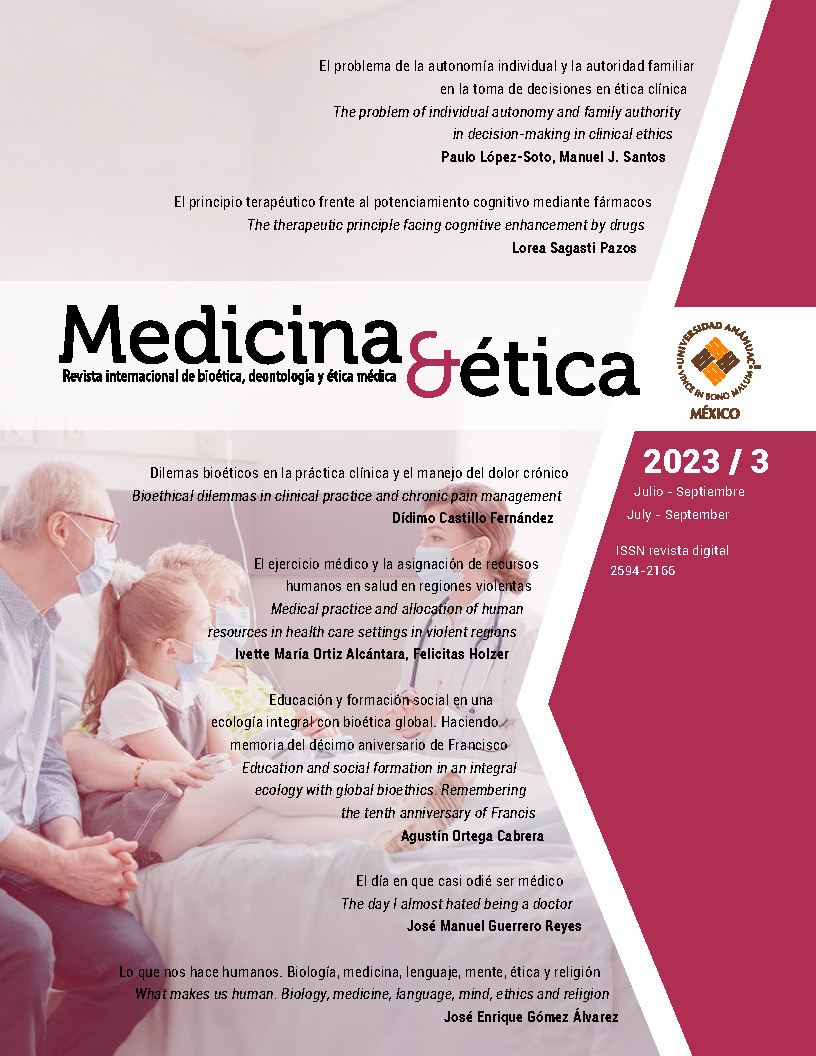
Descargas
Publicado
Número
Sección
Licencia
Derechos de autor 2023 Lorea Sagasti Pazos

Esta obra está bajo una licencia internacional Creative Commons Atribución-NoComercial-CompartirIgual 4.0.
Medicina y Ética se distribuye bajo Licencia Creative Commons Atribución-NoComercial-CompartirIgual 4.0 Internacional.
El autor conserva los derechos patrimoniales sin restricciones y garantiza a la revista el derecho de ser la primera publicación del trabajo. El autor es libre de depositar la versión publicada en cualquier otro medio, como un repositorio institucional o en su propio sitio web.













